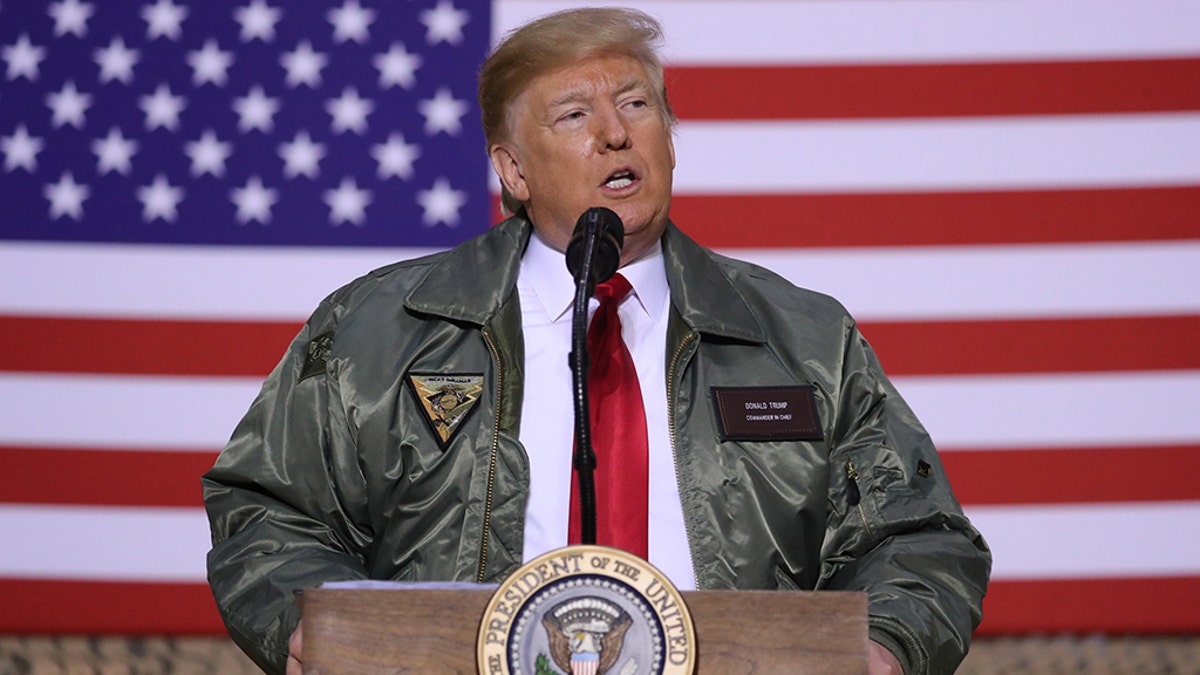
President Trump delivers remarks to U.S. troops in Iraq Wednesday. REUTERS/Jonathan Ernst
President Trump’s foreign policy accomplishments in his first two years are staggering in their success and demonstrate an evolving set of principles upon which the president is acting.
From muting the North Korean missile and nuclear threat, to mostly defeating ISIS in Iraq and Syria, to countering Russia by insisting that NATO member nations to pay their fair share to defend themselves, President Trump is hitting on all international relations cylinders.
We now have an emerging Trump Doctrine, some of which is captured in his own National Security Strategy. It has the following tenets:
1. America First in everything we do.
2. No “forever wars” that lead to costly nation-building.
3. Engage alliances to serve U.S. interests as well as those of other member nations.
4. Increase defense budgets to properly counter Russia and China.
5. Surgically defeat terrorism at its source.
6. Give commanders the full authority to prosecute combat operations.
7. Leverage all of the elements of power – diplomatic, informational, military and economic – to achieve strategic aims.
CLICK HERE TO GET THE FOX NEWS APP
The term America First is more than a slogan; it is a philosophy.
Whereas President Obama believes that a weaker America makes for a stronger world, President Trump believes that American exceptionalism compels the world to be better. With enhanced power and leverage throughout the world, America is able to shape events to support democracy and capitalism.
There has been no administration in recent history better at leveraging the elements of national power than the Trump administration.
Long-term engagements in countries or regions that do not threaten established U.S. vital interests serve no purpose for President Trump or America.
Withdrawing troops from Syria is the perfect example of the Trump Doctrine at work. U.S. forces are in Syria to defeat the ISIS terrorists. After some significant recent victories, President Trump is “selling into strength,” to use a stock market term.
Instead of staying too long and getting sucked into a long-term commitment, the president is removing our troops – and the temptation – so that we can husband our resources for other fights.
President Trump’s interaction with NATO nations and with Gulf nations are two examples of his approach to alliances.
The president’s message to NATO nations is clear: Pay your fair share, beef up your defenses and quit riding on the back of the U.S.
The president’s message to Saudi Arabia is equally clear: If you want to counter the Iranian hegemonic drive in the Middle East, there’s no better place to do that than Syria.
Because President Trump has spoken loudly and clearly to these allies, NATO nations are now paying more for their defense and Saudi Arabia is providing troops to fight ISIS and check Iran in Syria.
The U.S. defense budgets for the last two years have been historic in their size. The priorities outlined in the budgets have highlighted the need to counter Russia and China, especially in the missile, nuclear and cyber domains. We are in an arms race with these two peer competitors after falling behind during the Obama administration.
During his visit Wednesday to U.S. forces in Iraq, President Trump discussed use of an over-the- horizon force to strike terrorists in the Middle East. This is a clear articulation of his interests in avoiding nation-building and being forward-deployed to strike terrorism at its roots.
When President Obama was the commander-in-chief, it was commonplace for commanders in the field to have to call the Pentagon or White House to get approval for missions and targets. That’s known as giving the commander the responsibility without the authority – and it’s a recipe for failure.
President Trump immediately gave commanders in the field the authority they need to go with their responsibilities. The positive results were immediate. This changing of the rules of engagement is the No. 1 reason the U.S.-led coalition in Syria effectively defeated ISIS so quickly.
There has been no administration in recent history better at leveraging the elements of national power than the Trump administration.
North Korea is a perfect example of hitting all of the right diplomatic, information, military, and economic notes.
Secretary of State Mike Pompeo and U.S. Ambassador to the U.N. Nikki Haley conducted diplomacy.
President Trump conducted information warfare by engaging “Little Rocket Man” – North Korean leader Kim Jong Un.
Secretary of Defense James Mattis deployed a massive deterrent force of bombers, aircraft carriers, and fighter jets to the Sea of Japan and Guam.
And Treasury Secretary Steve Mnuchin leveraged economic measures to compel China to support our efforts, along with sanctions that took a bite out of North Korea’s already depleted economy.
The Trump Doctrine is one of leveraging all parts of government to achieve strategic aims. It is working and is a model for future administrations.








































